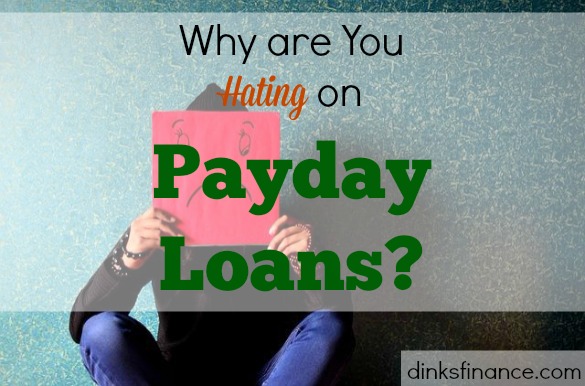
Good morning Dinks. Today we are talking about payday loans. For some reason, and honestly I am not sure why, but the personal finance blogging community seems to hate payday loans, payday loan companies and everything they stand for.
Maybe personal finance bloggers hate payday loans because they feel they should. Maybe personal finance bloggers hate payday loan companies because one of the blogging pioneers decided not to like payday loans and everyone else just decided to fall in line, or maybe personal finance bloggers don’t like payday loans because they are a form of debt.
Maybe you are hating on payday loans because you don’t understand them
As a financial planner I don’t necessarily like payday loans as a financial product, but I absolutely understand the business. Payday loan companies provide people with a short term loan at a high interest rate. If someone is low on their cash flow payday loans will give them a lump sum of cash until their next payday. Places like these are not for long term solutions to financial struggles, but they are a quick solution to a short term problem or emergency.
I had my share financial struggles in the past and I understand what it’s like to be hungry, so having a few extra bucks in your pocket until your next payday can be very helpful. Using a payday loan service once or twice is ok, but people have to understand that it is not a long term solution to improving your cash flow and your financial state.
If you really want to stop living paycheck to paycheck then you need to cut your spending, increase your income and learn to live on a budget. My personal budget philosophy is that if it doesn’t keep me warm, keep me clean or keep my belly full then I don’t need it.
Payday loans are not an emergency savings fund
Payday loans, just like other forms of debt such as credit cards and lines of credit, are not emergency savings – actually they are not savings at all. We live in a world where people cannot afford their lifestyles and they force themselves to live on credit. This is a very bad financial habit. In my previous financial life I would use my credit card to buy basic living needs because I didn’t have the cash in my bank account, but those days are over.
Cutting my expenses and earning a second income were the best financial decisions that I ever made. I learned to be financially responsible because I hit rock bottom when I was drowning in credit card debt. I stay financially responsible because I don’t ever want to go back to being broke.
I save my annual bonus, I save my tax refund and I save money on a regular basis with each paycheck to make sure that I always have some cash on hand in case I ever have an emergency. I don’t ever want to go back to living on credit and being in debt.
Now I use my credit card (my one and only credit card) a few times a month to maintain my credit score and I pay off the balance in full each month in an effort to avoid interest charges. It’s kind of ironic, I kept a balance on my credit card and paid interest when I couldn’t afford it and now that I can afford the monthly interest charges I avoid them like the flu. Consider this my lesson learned.
Photo by tax credits



Interesting article with some great points. I made some similar comments asking for opinions in December and didn’t get an awful lot of feedback.
Here in Australia the pay day loan trend is starting to flood our airwaves with a whole realm of advertising for new websites offering deals in the payday loan market which I am watching with interest.
I am quite curious to see if this trend here goes the same direction you mentioned in your article with it being tarnished with the distasteful brush.
Payday loans are the worst financial product available anywhere. End of story. The interest rates are exhorbitant and the greatly facilitate the cycle of keeping poor people poor.
If you are a consumer avoid payday loans at all costs.
James
Payday loans are definitely a short term solution, but at least it’s a way to get money fast. People understand that the interest rate is high and it’s best to pay them back asap. Thanks for reading.
You’ll also have to have a listing of references for them to use if they can not contact you. Accordingly consumers can ordinarily look for a slightly better loan offer when utilizing an internet cash loan.
A droopy boob said to the other saggy boob: “If we don’t get some support soon, everyone will think we’re nuts.”
Pingback:Tips to help keep your debit cards and your money safe | DINKS Finance
Pingback:Is it always about the price? - DINKS Finance | DINKS Finance